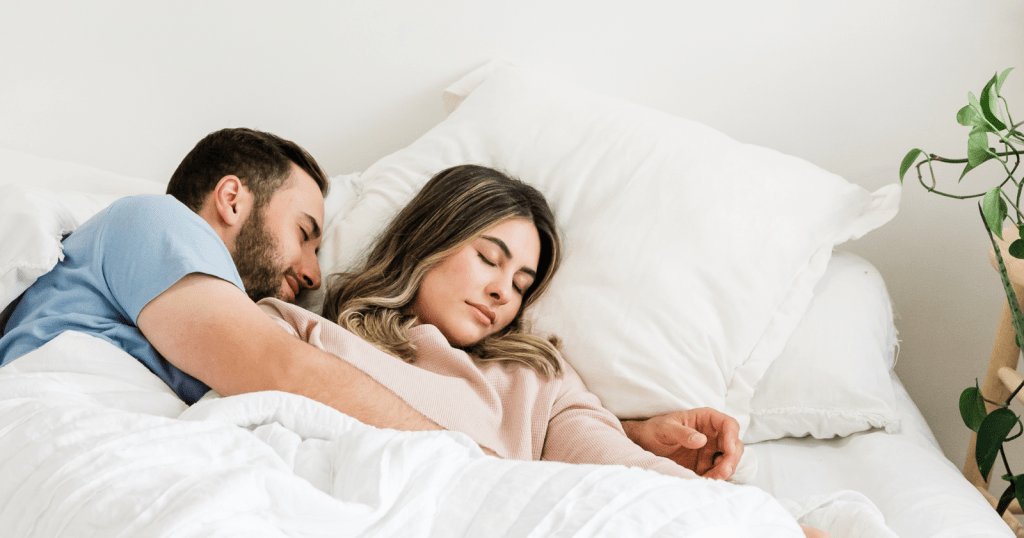Ever felt that spotlight glaring down on you when you’re just trying to enjoy an intimate moment? It’s frustrating, am I right?
Many men experience what’s often called bedroom anxiety—that nagging worry about performance that can quickly derail even the steamiest encounters.
It’s time to address this head-on, not just for better sex, but for better overall well-being.
Understanding the psychological underpinnings, and utilizing effective strategies will empower you to overcome bedroom anxiety and embrace confident, fulfilling intimacy.
Let’s dive into practical ways to overcome bedroom anxiety men can use to reignite the passion.
1) Understand Your Body & Anxiety
Do you ever find yourself overthinking every sensation, every movement, during sex, wondering if you’re doing it “right”?
This is a classic sign of performance anxiety, and it’s often fueled by a lack of accurate information or unrealistic expectations.
Think of it like this: if you don’t understand how your car works, you’ll be anxious every time you drive it. But understanding the engine, the brakes, and the controls gives you confidence behind the wheel.
Similarly, educating yourself about your own body and how it responds sexually is vital. Begin with simple steps such as reading about sexual health and openly discussing sex with your partner and/or healthcare professional; next demystify the situation.
The fear of the unknown is a powerful anxiety trigger.
A study found that sexual anxiety is significantly related to a lack of sexual knowledge and communication. Start by understanding the physiology of arousal and orgasm. Knowledge translates to control and, ultimately, more confidence.
2) Being Present in the Moment
I once ruined a perfectly good date because I was so focused on what my date thought of me, I wasn’t actually with her. Turns out, overthinking is a major passion killer, and many men deal with that.
Mindfulness is the practice of being present in the moment without judgment. In the context of sex, this means focusing on the sensations in your body, your partner’s reactions, and the immediate experience, rather than getting caught up in thoughts about past performances or future outcomes.
It helps you to be present and enjoy the moment rather than worrying about every detail. For example, you can use basic meditations techniques such as focusing on breathing and releasing tension in your body.
The core of mindfulness lies in directing your attention away from intrusive thoughts, which can disrupt the flow of intimacy. The more present you are, the easier it will be to focus on what is happening in the moment rather than what could happen.
“Mindfulness is awareness that arises through paying attention, on purpose, in the present moment, non-judgmentally.”
3) Talk to Your Partner
Have you ever bottled up your feelings, hoping they’d magically disappear, only to find they explode at the worst possible moment?
Open communication with your partner is a cornerstone of overcoming bedroom anxiety. Sharing your anxieties, fears, and desires can create a deeper sense of connection and intimacy.
Start small: express your appreciation for your partner, and gently voice concerns. Instead of staying silent, express your desires, and needs.
The Gottman Institute emphasizes that effective communication is the cornerstone of a strong relationship. Discussing your anxieties is not a sign of weakness, but a display of trust and vulnerability.
When you communicate openly, you create space for mutual understanding and support. This will then ease anxiety for both parties involved, making the whole experience that much more enjoyable!
4) Sensate Focus

When bedroom anxiety takes over, the focus shifts from pleasure to performance. Sensate focus is a technique designed to reverse this, focusing on non-demanding touch and sensory exploration.
Essentially, it’s about taking the pressure off the “goal” of intercourse and rediscovering the joy of physical connection. Start by setting aside dedicated time for intimacy, without the expectation of sex.
Explore each other’s bodies through gentle touch, focusing on sensations and emotions. The technique progresses through stages, gradually incorporating more intimate forms of contact, but always maintaining the emphasis on pleasure rather than performance.
By focusing on sensual sensations rather than performance, this technique helps couples to relax and re-establish intimacy in a way that reduces anxiety and improves sexual satisfaction.
Consider using a product like Lube Life Water-Based Personal Lubricant (affiliate link) to enhance the sensual experience.
5) Challenge Negative Thoughts
Do negative thoughts ever run wild in your head, like a broken record playing the same discouraging tune?
Cognitive restructuring is a therapeutic technique that helps you identify and challenge these negative thought patterns that fuel anxiety. The technique requires you to identify negative thought patterns and then challenge them by examining the evidence for and against these thoughts.
For example, replace “I always fail” with “I have had setbacks in the past, but I’m learning and improving.” This is an essential skill that can be applied to other areas of life.
You begin to see things from a different perspective by challenging your negative thoughts which leads to improved self-esteem and confidence.
6) Prioritize Overall Well-being
Years ago, I used to think I could burn the candle at both ends and still perform at my best. But I soon realized that neglecting my overall well-being directly impacted my confidence and performance in all areas of my life, including the bedroom.
Stress, poor diet, lack of sleep, and substance use can significantly contribute to anxiety and sexual dysfunction. Prioritizing your overall well-being can have a dramatic impact on your sexual health.
Begin by evaluating your daily habits, such as, ensure adequate sleep, regular exercise, healthy food intake, and minimizing alcohol and tobacco use. Studies have shown that chronic stress can lead to erectile dysfunction and decreased libido.
As Mayo Clinic emphasized, “Lack of sleep can decrease your libido and increase your chances of erectile dysfunction.”
Also, the American Psychological Association emphasizes the importance of stress management for overall health. Making small changes, such as scheduling regular exercise or practicing relaxation techniques, can make a significant difference.
By prioritizing your overall well-being, you’re not only improving your physical health but also nurturing a more confident and relaxed mindset, which is essential for overcoming bedroom anxiety. You will be thanking yourself in the long run.
Conclusion
Imagine a scenario: It’s date night, and instead of dreading what might happen, you feel a sense of calm excitement.
You’ve spent the day nourishing your body with a healthy meal, squeezing in a workout to release any built-up tension, and even taking a few minutes for mindful breathing to center yourself.
This isn’t about performing; it’s about connecting with your partner and enjoying the shared experience. It’s crucial to understand that overcoming bedroom anxiety is a journey that requires patience, self-compassion, and a willingness to embrace vulnerability.
By implementing these strategies, you’re not just improving your sex life, but transforming your mindset and relationship with yourself.
The power to perform with confidence lies within you—take control and embrace your potential for pleasure and connection.

Michael Carter is a seasoned professional with a decade of experience specializing in sexual health and sexually transmitted infections. As a dedicated advocate for public health, Michael has worked extensively to raise awareness about the prevention of sex-related diseases. With a blend of scientific rigor and an approachable style, he aims to empower readers with the knowledge they need to make informed decisions about their health and well-being. When not writing, he likes to bond with his closest friends over Japanese food or a drink.





